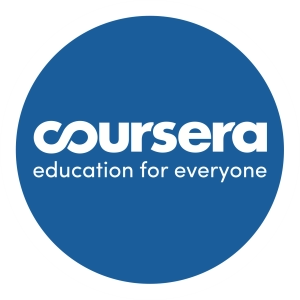
-
Coursera – Detailed Explanation : Provides online courses for vocational skills.
Coursera is an online learning platform offering courses, specializations, and degrees across a wide range of subjects in partnership with top universities and organizations. It provides accessible and flexible learning options for individuals seeking to gain knowledge or improve their skills.
1- On which platform are the tools used?
Coursera can be accessed via the following platforms:
✅ Web Platform:
- Desktop: Coursera is accessible on any modern web browser (e.g., Google Chrome, Mozilla Firefox, Safari, Edge).
- Mobile Devices:
- Android: Available on the Google Play Store.
- iOS: Available on the App Store.
- Smart TVs and Streaming Devices: Some devices support the Coursera app for learning directly from a TV.
2- What hardware requirements are needed?
The hardware requirements for accessing Coursera are minimal and standard for most modern devices:
Minimum Requirements
- Processor: Intel or AMD processor (modern generation).
- RAM: 2GB RAM or higher.
- Storage: 100MB of free disk space.
- Internet: A stable internet connection (minimum 3 Mbps for smooth video streaming).
Recommended Requirements
- Processor: Intel i3/i5 or AMD Ryzen 3/5.
- RAM: 4GB or more for better multitasking.
- Storage: SSD or HDD with 200MB+ free space.
- Internet Speed: 5 Mbps or higher.
3- Installation and membership stages
Installation Steps
For Desktop (Web Version)
- Visit the official Coursera website at https://www.coursera.org.
- Sign up using an email address, Google account, or Facebook account.
- Once logged in, you can start browsing and enrolling in courses.
For Mobile Devices (iOS & Android)
- Download the Coursera app from the App Store (iOS) or Google Play Store (Android).
- Open the app and sign up or log in.
- Once logged in, you can browse, enroll, and start learning directly from your mobile device.
Membership & Sign-Up Process
- Create an account for free by providing an email or linking it to Google/Facebook.
- Browse free and paid courses.
- For paid courses and certifications, users can opt for a subscription or one-time payment depending on the course.
- Coursera Plus offers access to over 3,000 courses with one monthly subscription.
4- What can it be used for?
Coursera is primarily used for:
✅ Learning New Skills – Coursera offers courses in a wide array of subjects, including business, technology, data science, arts, humanities, social sciences, and more.
✅ Certifications – Users can earn professional certificates and specializations in areas such as programming, AI, digital marketing, cloud computing, and project management.
✅ Degree Programs – Coursera offers full online degree programs in collaboration with top universities, including Master’s and Bachelor’s degrees in fields like business, engineering, and computer science.
✅ Hands-On Projects – Many courses provide interactive projects to apply theoretical knowledge.
✅ Career Development – Coursera’s career services provide opportunities to network and access job portals.5- What is its prominent feature compared to other tools?
Coursera stands out because of:
🟢 University and Industry Partnerships – Coursera works with over 200 top universities and leading companies (e.g., Google, IBM, and Stanford) to provide accredited courses and certifications.
🟢 Professional Certifications & Degrees – Unlike many platforms, Coursera offers certifications and degree programs from accredited universities, allowing learners to earn recognized qualifications that can boost careers.
🟢 Diverse Learning Formats – Coursera offers various learning paths, from short courses to specializations and degree programs, providing flexibility for learners at all stages of their education or career.
🟢 Learning Flexibility – Coursera courses can be done at the learner’s pace, with options for self-paced learning or scheduled deadlines, accommodating both casual learners and professionals.
6- Sample application made with pictures
Example: Data Science Course on Coursera
- Course Overview:
- Title: Data Science Specialization
- Instructor: Johns Hopkins University
- Duration: 6 months
- Content: Video lectures, quizzes, assignments, peer-graded projects, and hands-on coding challenges.
- Course Features:
- Interactive video lectures.
- Assignments: Learn data cleaning, data visualization, and machine learning techniques using R programming.
- Capstone Project: At the end of the course, complete a real-world data science project.
📌 Example Screenshot:
7- Which courses can it be used in and is compatible with?
Coursera offers a wide range of courses across various fields. Some examples include:
✅ Business & Management
- Business Strategy
- Leadership & Management
- Entrepreneurship
✅ Technology & Computer Science
- Data Science
- Cloud Computing
- AI & Machine Learning
- Web Development
✅ Humanities & Social Sciences
- Psychology
- Philosophy
- History
✅ Health & Medicine
- Public Health
- Nursing
- Nutrition
✅ Art & Design
- Graphic Design
- Music Theory
✅ Specializations & Professional Certifications
- Google IT Support Professional Certificate
- IBM Data Science Professional Certificate
- Amazon Web Services (AWS) Certification
✅ Vocational Education & Career Skills
- Coursera offers vocational courses such as data entry, digital marketing, and project management that can be useful for vocational students.
8- Is it free?
✅ Free Courses:
- Many courses on Coursera are free to audit. Learners can access video lectures and some materials without paying.
✅ Paid Content:
- For certificates, specializations, or degree programs, learners need to pay. Some courses offer financial aid to learners who cannot afford the fee.
✅ Coursera Plus:
- A subscription service that gives access to thousands of courses for a monthly fee.
9- Links Related to Coursera
🔗 Official Website: https://www.coursera.org
🔗 Coursera for Business: https://www.coursera.org/business
🔗 Coursera for Educators: https://www.coursera.org/educators
🔗 Coursera Help Center: https://learner.coursera.help
🔗 Download Coursera (App):